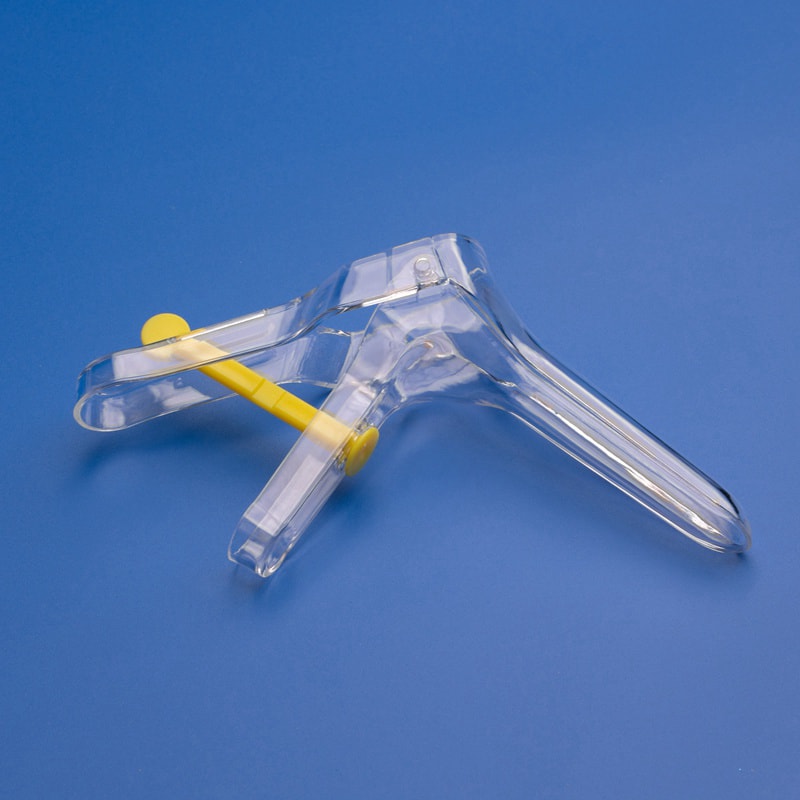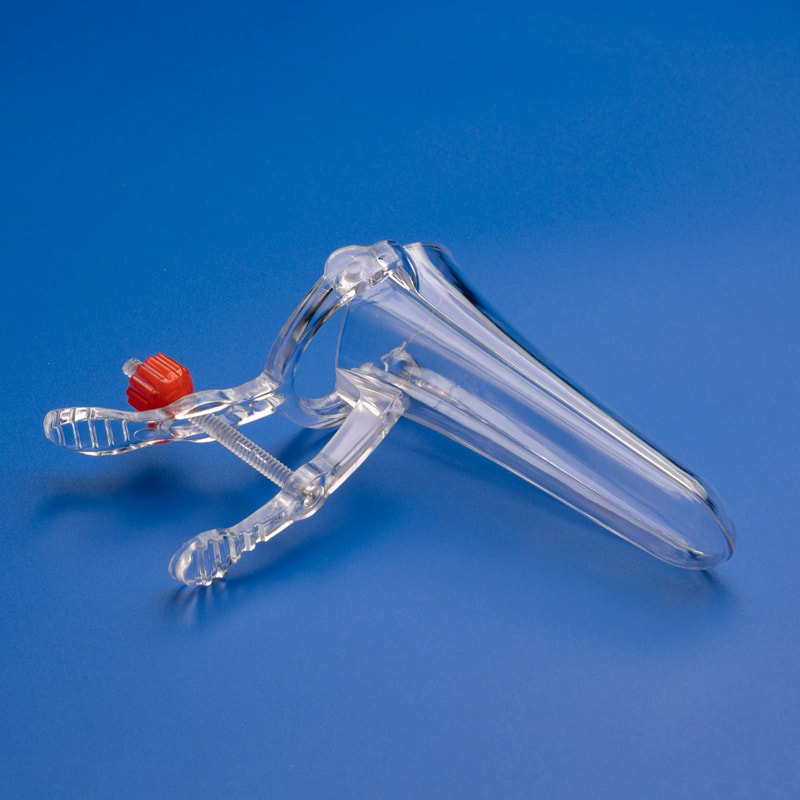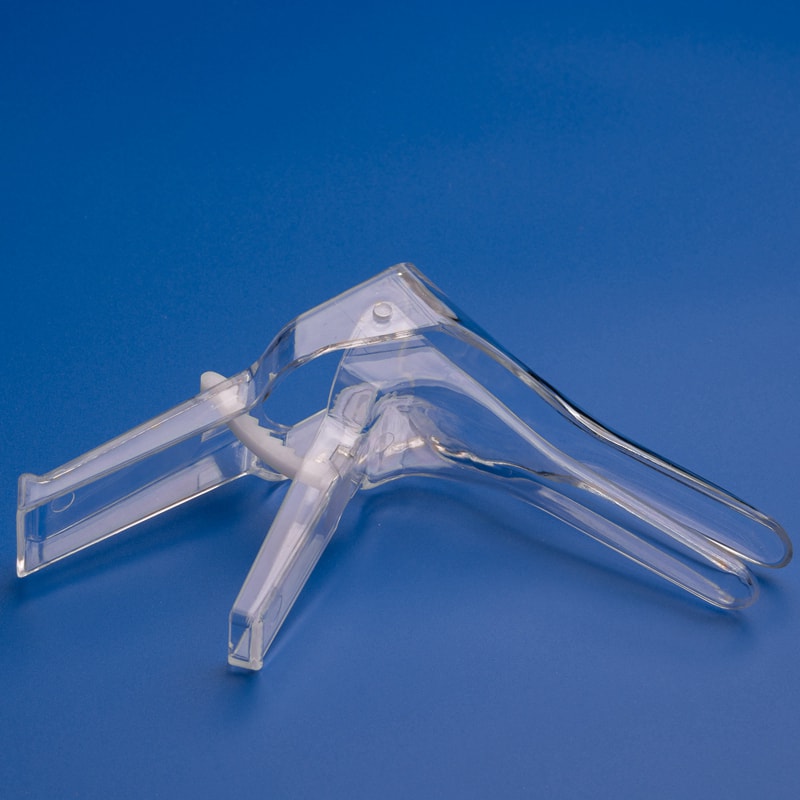Comment l'IA impacte le contrôle qualité dans la fabrication de dispositifs médicaux
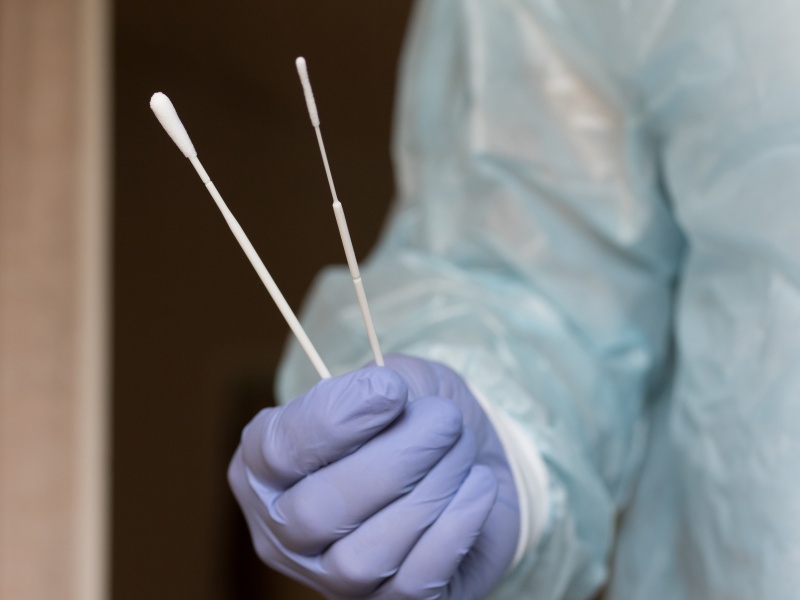
Partager
1. Introduction : Le rôle du contrôle qualité dans la fabrication de dispositifs médicaux
Dans le monde hautement réglementé de la fabrication de dispositifs médicaux, le contrôle qualité (CQ) n'est pas un luxe—c'est une nécessité. Chaque produit entrant dans un cadre clinique ou diagnostique doit répondre aux normes les plus élevées en matière de sécurité, de stérilité et de fonctionnalité. Pour les fabricants, fournisseurs et distributeurs, garantir une qualité de produit constante est crucial non seulement pour respecter les exigences de conformité des organismes réglementaires comme la FDA et le marquage CE, mais aussi pour bâtir une confiance à long terme avec les clients B2B à travers l'écosystème de la santé.
Ces dernières années, Intelligence Artificielle (IA) est apparue comme une force transformative dans le secteur de la fabrication de dispositifs médicaux. De la détection améliorée des défauts à la maintenance prédictive, l'IA redéfinit la manière dont le contrôle qualité est géré—offrant des résultats plus rapides, plus précis et plus rentables.
Pour les acheteurs B2B—y compris les départements d'approvisionnement hospitaliers, les laboratoires de diagnostic, les OEM et les distributeurs en gros—comprendre l'impact de l'IA sur le contrôle qualité peut offrir un avantage stratégique. Cela peut vous aider à identifier des fournisseurs fiables, à réduire les rappels de produits et à vous assurer que les consommables médicaux que vous achetez respectent les normes internationales.
Pourquoi le contrôle qualité est non négociable dans la fabrication médicale
Les dispositifs médicaux et consommables, tels que les écouvillons, les brosses cervicales et les contenants d'échantillons, interagissent directement avec les patients et les échantillons biologiques. Même des défauts mineurs peuvent entraîner :
- Échantillons contaminés
- Résultats diagnostiques erronés
- Risque accru d'infection
- Non-conformité réglementaire
- Responsabilités légales et rappels
Pour atténuer ces risques, les fabricants doivent mettre en œuvre des systèmes robustes d'assurance qualité tout au long du cycle de production—de l'inspection des matières premières à l'emballage final du produit.
CQ traditionnel vs. CQ alimenté par l'IA
| Aspect | Méthodes traditionnelles de CQ | Approches de CQ alimentées par l'IA |
|---|---|---|
| Vitesse d'inspection | Manuelle, chronophage | Temps réel, automatisée |
| Précision | Sujet à l'erreur humaine | Haute précision grâce à l'apprentissage automatique |
| Évolutivité | Limitée par la main-d'œuvre | Facilement évolutive avec des modèles algorithmiques |
| Analyse des données | Réactive (après défaut) | Prédictive et préventive |
| Efficacité des coûts | Coûts de main-d'œuvre élevés | Réduction des coûts opérationnels à long terme |
L'utilisation de l'IA introduit un nouveau niveau d'efficacité et de fiabilité dans les processus qualité, en faisant un élément transformateur pour les fabricants et leurs clients B2B.
2. Tendances du marché : Intégration de l'IA dans les processus d'assurance qualité
Le marché mondial de l'IA dans la fabrication de dispositifs médicaux croît rapidement, porté par la demande de productivité accrue, de taux d'erreur plus bas et d'une conformité renforcée. Selon un rapport de 2023 de Grand View Research, le marché de l'IA dans la fabrication de soins de santé devrait dépasser 12 milliards de dollars d'ici 2030, le contrôle qualité étant l'un des segments d'application à la croissance la plus rapide.
Principaux moteurs de l'adoption de l'IA dans le contrôle qualité
- Rigidité réglementaire: Avec des contrôles plus stricts de la FDA, du RDM de l'UE et des normes ISO, l'IA aide les fabricants à maintenir la conformité.
- Pressions sur les chaînes d'approvisionnement mondiales: L'IA assure la cohérence et la traçabilité à travers les chaînes d'approvisionnement internationales.
- Demande croissante pour les consommables médicaux: Après la pandémie, le besoin d'outils diagnostiques précis et stériles a explosé.
- Besoins d'optimisation des coûts: L'IA réduit les coûts de main-d'œuvre et le gaspillage de matériaux grâce à une fabrication précise.
Applications de l'IA dans le CQ pour la fabrication de dispositifs médicaux
| Domaine d'application de l'IA | Description |
|---|---|
| Vision par ordinateur | Utilisée pour la détection en temps réel des défauts de surface sur les écouvillons, brosses et kits. |
| Algorithmes d'apprentissage automatique | Analysent les données historiques pour prédire les problèmes potentiels de CQ avant qu'ils ne surviennent. |
| Maintenance prédictive | Les capteurs IA surveillent les machines pour prévenir les pannes qui pourraient affecter la qualité. |
| Reconnaissance d'images automatisée | Assure une dimensionnement et un étiquetage cohérents des consommables. |
| Traitement du langage naturel (NLP) | Examine les rapports de CQ pour identifier les anomalies ou tendances. |
Segments d'industrie voyant une intégration rapide de l'IA
- Consommables respiratoires (p. ex., écouvillons nasaux pour les tests COVID-19)
- Les kits de diagnostic gynécologiques
- Outils d'échantillonnage stériles
- Dispositifs diagnostiques urologiques
Les acheteurs en gros, les OEM et les distributeurs B2B privilégient de plus en plus les fournisseurs qui exploitent le contrôle qualité piloté par l'IA pour assurer la fiabilité et la traçabilité des produits.
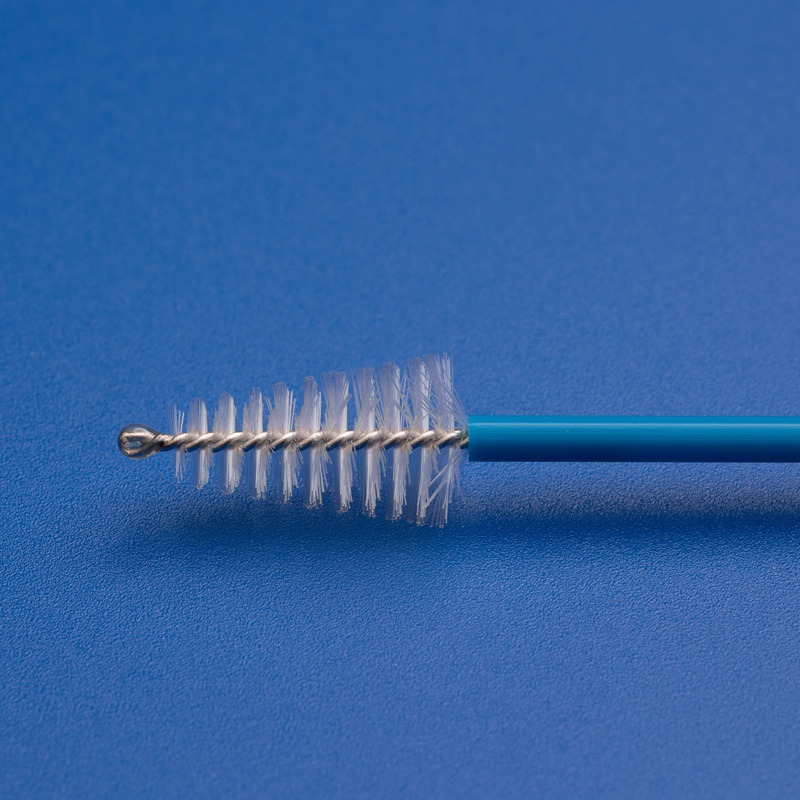
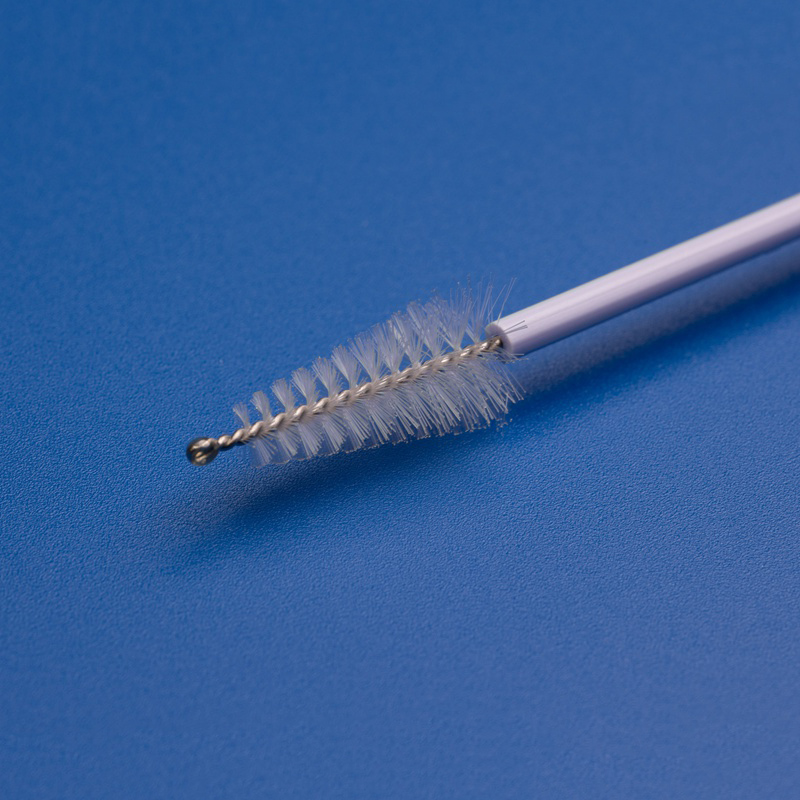
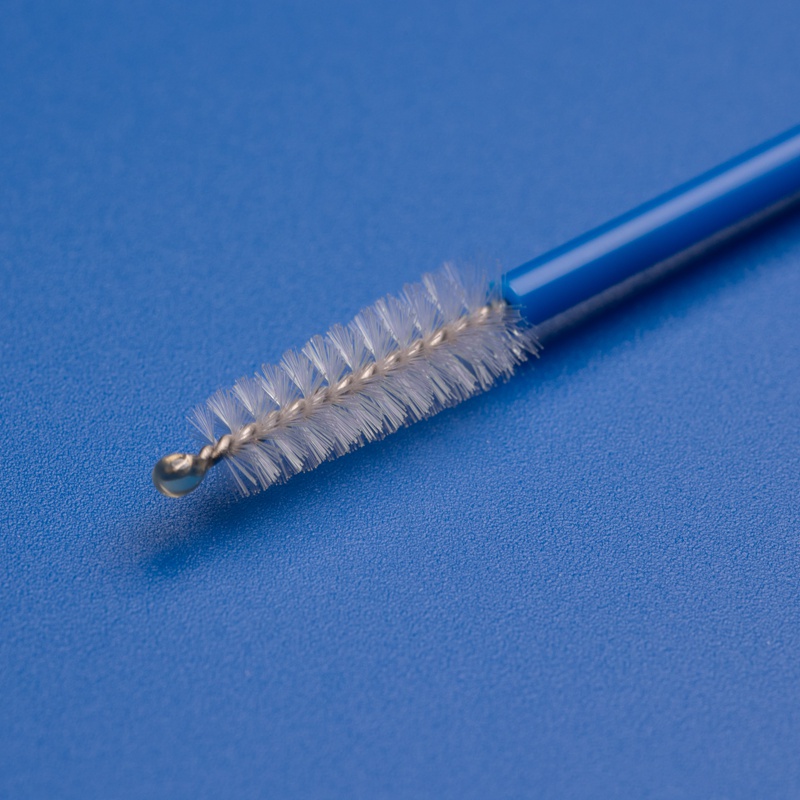
3. Avantages clés de l'IA pour le contrôle qualité des dispositifs médicaux
L'IA n'est pas seulement un mot à la mode—elle apporte des améliorations mesurables en qualité, cohérence et conformité. Pour les acheteurs B2B et les responsables des achats, sélectionner un fournisseur qui intègre l'IA dans son cadre de CQ peut offrir des avantages significatifs en aval.
1. Cohérence accrue des produits
Les algorithmes IA assurent l'uniformité à travers les lots de production à grande échelle. Par exemple, dans la fabrication d'écouvillons d'échantillonnage ou de brosses cervicales, la vision par ordinateur peut détecter même des déviations microscopiques en longueur, densité de fibres ou forme.
- ✅ Réduit la variabilité inter-lots
- ✅ Assure la compatibilité avec les instruments de laboratoire
- ✅ Améliore l'expérience utilisateur pour les cliniciens
2. Temps de traitement plus rapides
En automatisant l'inspection et l'analyse, l'IA réduit drastiquement le temps nécessaire aux processus de CQ, permettant une livraison plus rapide aux utilisateurs finaux et aux clients B2B.
- ⚡ Inspection en temps réel via des caméras haute vitesse
- ⚡ Signalement et retrait instantanés des défauts de la ligne de production
- ⚡ Vérifications de conformité plus rapides
3. Taux de défauts plus bas
Les modèles d'apprentissage automatique formés sur des données historiques de défauts peuvent identifier les signes avant-coureurs précoces dans le processus de production, permettant des actions correctives avant que les défauts ne surviennent.
- 🔍 Alertes prédictives pour les anomalies de matériaux
- 🔍 Reconnaissance de motifs pour les lots défectueux
- 🔍 Réduction des unités rejetées et des coûts de retouche
4. Amélioration de la conformité réglementaire
L'IA garantit que chaque unité produite respecte les exigences réglementaires strictes. Les fonctions d'automatisation des rapports et de traçabilité simplifient les audits et les vérifications.
- 📋 Pistes d'audit automatisées
- 📋 Contrôles de conformité en temps réel
- 📋 Documentation ISO, FDA et CE facilitée
5. Efficacité des coûts à grande échelle
Bien que la mise en œuvre de l'IA nécessite un investissement initial, elle réduit considérablement les coûts à long terme en minimisant les déchets, la main-d'œuvre et les rappels.
| Domaine d'économie des coûts | Impact de l'intégration de l'IA |
|---|---|
| Coûts de main-d'œuvre | Réduction allant jusqu'à 40 % grâce aux inspections automatisées |
| Gaspillage de matériaux | Réduction des rebuts grâce à la détection précoce des défauts |
| Rappels de produits | Risque réduit grâce à une traçabilité renforcée |
| Retouche et temps d'arrêt | Prévenus grâce à l'analyse prédictive |
6. Avantage concurrentiel pour les acheteurs B2B
Les distributeurs et partenaires OEM gagnent un avantage concurrentiel en s'alignant sur des fabricants dotés de l'IA. Cela assure une livraison constante de produits fiables, améliorant la satisfaction client et la réputation de la marque.
- 🏆 Taux de remplissage plus élevé
- 🏆 Réduction des plaintes clients
- 🏆 Partenariats fournisseurs plus solides
4. Principales technologies IA redessinant la fabrication de dispositifs médicaux
L'intégration de l'IA dans la fabrication de dispositifs médicaux ne se limite pas à une seule technologie. Un large spectre de systèmes intelligents est désormais appliqué pour assurer une qualité de produit supérieure, optimiser les flux de production et maintenir la conformité réglementaire. Ces technologies sont particulièrement importantes dans la fabrication de consommables pour tests médicaux, où la précision et la stérilité sont primordiales.
Pour les acheteurs B2B – y compris les OEM, les équipes d'approvisionnement hospitalier et les laboratoires de diagnostic – comprendre les technologies IA spécifiques utilisées par les fournisseurs peut éclairer de meilleures décisions d'approvisionnement et assurer une performance prévisible de la chaîne d'approvisionnement.
1. Vision par machine et apprentissage profond
La vision par machine utilise des caméras haute résolution et des algorithmes IA pour inspecter les produits en temps réel. Les modèles d'apprentissage profond, entraînés sur des milliers d'images de produits, peuvent identifier même les défauts les plus subtils que les inspecteurs humains pourraient manquer.
✅ Applications :
- Détection de fissures capillaires dans les conteneurs d'échantillons
- Identification d'irrégularités des fibres dans les écouvillons nasaux et pharyngés
- Assurance d'une distribution uniforme des poils dans les brosses cervicales
| Fonctionnalité | Contrôle qualité traditionnel | Contrôle qualité visuel alimenté par l'IA |
|---|---|---|
| Vitesse d'inspection | Plus lent (manuel) | Temps réel (millisecondes) |
| Précision de détection des défauts | ~80% | >99% |
| Risque de fatigue de l'opérateur | Élevée | Aucun |
2. Robotique intelligente
Les systèmes robotiques pilotés par l'IA sont désormais utilisés pour des tâches comme l'assemblage automatisé, l'emballage et la manipulation d'échantillons. Ces robots sont équipés de capteurs et d'algorithmes IA qui leur permettent de s'adapter à des environnements changeants et à des variations de produits.
✅ Applications :
- Scellage automatisé des emballages stériles
- Assemblage de précision des kits de diagnostic
- Manipulation de composants délicats comme les pointes d'écouvillons
3. Analyse prédictive
L'une des applications les plus transformatrices de l'IA est l'analyse prédictive. En analysant les données de production, l'IA peut anticiper les problèmes de qualité avant qu'ils ne surviennent.
✅ Applications :
- Prédiction des pannes de machines pouvant affecter la stérilité des produits
- Identification des tendances menant à des incohérences dans les lots
- Optimisation de l'utilisation des matières premières pour assurer une formulation cohérente
| Fonctionnalité prédictive | Avantage pour l'acheteur B2B |
|---|---|
| Alertes précoces de défauts | Réduction du risque d'expéditions en vrac défectueuses |
| Planification de la maintenance | Évite les arrêts de production qui retardent la livraison des commandes |
| Optimisation des lots | Assure des performances produits cohérentes |
4. Traitement du langage naturel (NLP)
Le NLP est utilisé pour analyser la documentation de contrôle qualité, les rapports réglementaires et les retours clients afin d'identifier les problèmes récurrents ou les lacunes en matière de conformité.
✅ Applications :
- Génération automatisée de rapports pour les audits
- Détection d'anomalies dans les journaux de contrôle qualité
- Extraction des tendances de rétroaction des rapports des distributeurs
5. Jumeaux numériques activés par l'IA
Les jumeaux numériques sont des répliques virtuelles des systèmes de production physiques. Grâce à l'intégration de l'IA, ces jumeaux numériques peuvent simuler les conditions de fabrication et prédire l'impact des changements dans le processus sur la qualité des produits.
✅ Applications :
- Simulation des impacts environnementaux sur la stérilité
- Test de nouveaux matériaux avant les essais physiques
- Optimisation des vitesses de ligne sans compromettre la qualité
Ces technologies ne sont pas seulement théoriques – elles sont activement utilisées par des fabricants visionnaires comme Jiangsu Hanheng Medical Technology Co., Ltd., dont les systèmes de production renforcés par l'IA offrent une précision et une fiabilité inégalées dans les consommables pour tests médicaux.
5. Pourquoi de plus en plus d'OEM et de distributeurs exigent un contrôle qualité renforcé par l'IA
Dans la chaîne d'approvisionnement concurrentielle du secteur de la santé d'aujourd'hui, les acheteurs B2B subissent une pression croissante pour réduire les coûts, maintenir la conformité et assurer la plus haute qualité des produits. Par conséquent, les OEM et les distributeurs médicaux priorisent les fournisseurs qui utilisent des systèmes de contrôle qualité renforcés par l'IA.
Facteurs clés des préférences des acheteurs B2B
- Atténuation des risques
L'IA réduit les risques de rappels de produits, de violations réglementaires et d'insatisfaction des utilisateurs finaux – tous éléments qui peuvent gravement endommager la réputation d'une marque. - Transparence des fournisseurs
L'IA permet un enregistrement et un rapport de données complets, facilitant l'évaluation des performances des fournisseurs par les acheteurs. - Évolutivité
Alors que la demande pour des consommables comme les écouvillons ou les kits gynécologiques augmente à l'échelle mondiale, l'IA permet aux fabricants d'échelonner la production sans sacrifier la qualité. - Prêt pour les audits
Les distributeurs et les OEM doivent souvent fournir une traçabilité lors des audits réglementaires. Les systèmes d'IA offrent une documentation automatique et des historiques de qualité traçables.
Données d'enquête : Ce que les acheteurs B2B attendent
Selon une enquête Deloitte de 2023 auprès de plus de 300 professionnels de l'approvisionnement en dispositifs médicaux :
| Fonctionnalité importante pour les acheteurs | Pourcentage la citant comme « critique » |
|---|---|
| Contrôle qualité renforcé par l'IA | 78% |
| Conformité aux normes ISO/FDA | 92% |
| Rapports d'audit automatisés | 65% |
| Métriques de qualité prédictives | 59% |
Étude de cas : Impact sur l'approvisionnement en écouvillons
Un distributeur de diagnostics européen se procurant des écouvillons nasaux auprès de fournisseurs traditionnels a connu un taux de rejet de 12 % en raison d'incohérences de fibres. Après avoir basculé vers un partenaire de fabrication alimenté par l'IA, le taux de rejet est tombé à moins de 1 %, entraînant :
- 500 000 $ d'économies annuelles en retouches et expéditions
- Temps de livraison 35 % plus rapides grâce au contrôle qualité automatisé
- Amélioration de la satisfaction client et des commandes répétées
Le passage à l'IA ne concerne pas seulement l'adoption de nouvelles technologies – il s'agit de garantir la qualité, la fiabilité et la conformité des produits à grande échelle.
6. Pourquoi choisir Hanheng : Un pionnier dans la fabrication de consommables médicaux intelligents
Parmi le nombre croissant de fournisseurs mondiaux intégrant l'IA dans leurs lignes de production, Jiangsu Hanheng Medical Technology Co., Ltd. se distingue comme leader en Chine. Avec un engagement fort envers l'innovation, la conformité internationale et les processus de production de pointe, Hanheng est le fournisseur de choix pour les acheteurs B2B à la recherche de fiabilité et d'évolutivité.
Points forts de l'approche de contrôle qualité pilotée par l'IA de Hanheng
- ✅ Installation de 32 acres avec une salle blanche de 10 000 m² de classe 100 000
- ✅ Systèmes de vision machine en temps réel pour la détection de défauts
- ✅ Algorithmes de maintenance prédictive pour prévenir les arrêts de contrôle qualité
- ✅ Emballage automatisé avec des bras robotiques pour le contrôle des contaminations
- ✅ Traçabilité numérique pour soutenir les audits ISO, FDA et CE
Pourquoi Hanheng est un partenaire de confiance pour les OEM et les distributeurs
| Proposition de valeur | Description |
|---|---|
| Systèmes avancés de contrôle qualité IA | Assurent plus de 99,5 % de cohérence par lot pour les écouvillons, brosses et kits de diagnostic |
| Certifications internationales | ISO 9001, ISO 13485, CE, FDA et plusieurs brevets de modèle d'utilité |
| Portefeuille de produits complet | Couvre les consommables respiratoires, urologiques et gynécologiques |
| Fortes capacités de R&D | Permet une innovation rapide et une personnalisation des produits |
| Expérience d'exportation mondiale | Fournitures à des hôpitaux, laboratoires et distributeurs dans plus de 40 pays |
Gamme de produits soutenue par l'IA
- Écouvillons nasaux et pharyngés
- Collecteurs d'échantillons cervicaux à usage unique
- Brosses de prélèvement cervical stériles
- Grattoirs et kits gynécologiques
- Boîtes d'échantillonnage et milieux de transport
Que vous soyez un responsable des achats hospitaliers, un OEM de diagnostics ou un distributeur médical mondial, s'associer à Hanheng signifie s'aligner avec un fournisseur qui livre des consommables médicaux cohérents et de haute qualité, propulsés par la précision de l'IA.
📩 Prêt à optimiser votre chaîne d'approvisionnement avec un contrôle qualité renforcé par l'IA ?
Contactez Jiangsu Hanheng à [email protected] ou visiter www.hanheng-medical.com pour demander un catalogue ou planifier une consultation.
7. Comment se procurer des consommables pour tests médicaux de haute qualité avec un contrôle qualité piloté par l'IA
Pour les acheteurs en gros, les OEM et les distributeurs, se procurer des consommables médicaux avec un contrôle qualité renforcé par l'IA n'est pas seulement un choix judicieux – cela devient une nécessité. Lors de la collaboration avec des fournisseurs mondiaux, vous devez vous assurer non seulement que les produits sont conformes et performants, mais aussi que les processus de fabrication qui les sous-tendent sont robustes, cohérents et audités.
Voici un guide étape par étape pour les acheteurs B2B sur la façon de se procurer des consommables pour tests médicaux de haute qualité auprès de fabricants qui exploitent l'IA dans leurs systèmes de contrôle qualité :
Étape 1 : Identifier les fabricants avec des systèmes de production intégrant l'IA
Tous les fournisseurs ne se valent pas. Commencez par établir une liste restreinte de fabricants reconnus pour leur innovation numérique et leur infrastructure de fabrication intelligente.
✅ Recherchez des fournisseurs qui offrent :
- Inspection visuelle en temps réel utilisant la vision machine
- Maintenance prédictive pour éviter les interruptions de production
- Documentation de contrôle qualité automatisée
- Traçabilité numérique des lots
- Classification des défauts pilotée par l'IA
📌 En Chine, Jiangsu Hanheng Medical Technology Co, Ltd. est l'exemple leader d'un tel fournisseur, offrant un contrôle qualité renforcé par l'IA sur toutes ses lignes de production.
Étape 2 : Vérifier les certifications et la conformité réglementaire
La conformité aux normes internationales est non négociable, particulièrement pour les consommables de qualité médicale qui interagissent avec des échantillons biologiques.
✅ Demandez :
- Certifications ISO 9001 et ISO 13485
- Marquage CE pour la distribution européenne
- Enregistrement FDA américain pour les marchés américains
- Brevets de modèle d'utilité ou innovations propriétaires
🛡️ Hanheng maintient tout cela et plus encore, assurant que vos produits passent même les inspections et audits les plus rigoureux.
Étape 3 : Demander un dossier technique et des données de contrôle qualité
Un fournisseur fiable fournira une documentation technique, incluant :
- Spécifications du produit
- Fiches de données de sécurité (FDS)
- Rapports de validation de la stérilisation
- Aperçu du flux de travail d'assurance qualité basé sur l'IA
- Métriques de performance de détection de défauts
📊 Tableau d'exemple : Métriques de contrôle qualité IA de la ligne d'écouvillons cervicaux de Hanheng
| Paramètre de contrôle qualité | Valeur de performance | Méthode d'intégration IA |
|---|---|---|
| Précision dimensionnelle | ± 0,2 mm | Vision machine + étriers numériques |
| Cohérence des fibres | Uniformité de 99,8 % | Modèle d'apprentissage profond |
| Niveau d'assurance de la stérilité | 10⁻⁶ | Analyses prédictives de stérilisation |
| Taux d'erreur d'étiquetage | < 0,1 % | OCR + vérification IA des codes-barres |
Étape 4 : Demander des échantillons et des commandes pilotes
Avant de s'engager dans un approvisionnement à grande échelle, demandez toujours des échantillons et effectuez des tests en laboratoire. Les fournisseurs utilisant l'IA offrent généralement une qualité de produit plus cohérente, même pour de petits lots.
🧪 Liste de contrôle d'évaluation des échantillons :
- Douceur et intégrité de l'extrémité de l'écouvillon
- Alignement des poils dans les brosses cervicales
- Stérilisation de l'emballage et intégrité des scellés
- Facilité d'utilisation en simulation clinique
- Précision des codes-barres et traçabilité
Hanheng propose des kits d'échantillonnage personnalisés sur demande pour aider les OEM et les institutions à valider la compatibilité et la performance des produits.
Étape 5 : Évaluer la flexibilité et l'évolutivité de la chaîne d'approvisionnement
Alors que la demande fluctue, particulièrement pendant les épidémies ou les pics saisonniers de tests, votre fournisseur doit être capable d'échelonner la production tout en maintenant la qualité.
✅ Demandez :
- Capacité de production sous systèmes de contrôle qualité IA
- Délais de livraison pendant les périodes de forte demande
- Performances historiques pendant les pics de demande (p. ex., COVID-19)
- Systèmes IA pour la prévision et l'exécution des commandes
Grâce à une planification prédictive pilotée par l'IA, Hanheng est capable de remplir de grandes commandes de volume pour écouvillons, brosses et kits à court préavis, sans compromettre les normes de contrôle qualité.
Étape 6 : Construire une relation à long terme
Établir une relation à long terme avec un fabricant activé par l'IA assure :
- Une qualité de produit constante
- Priorité d'exécution
- Développement collaboratif de produits
- Intégration facile avec votre ERP ou système d'approvisionnement
🤝 Hanheng offre à ses clients B2B une gestion de compte personnalisée, un soutien logistique de bout en bout et une transparence continue du contrôle qualité via des outils de reporting numérique.
📩 Intéressé par l'échantillonnage de consommables pour tests médicaux inspectés par l'IA ? Contactez Hanheng à [email protected] ou visiter www.hanheng-medical.com pour demander un devis.
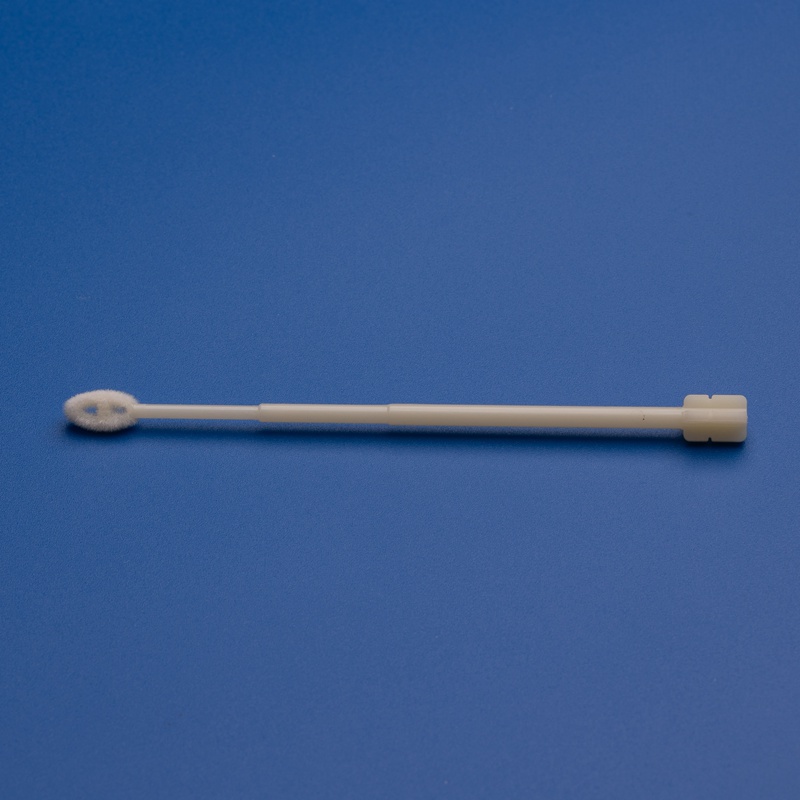
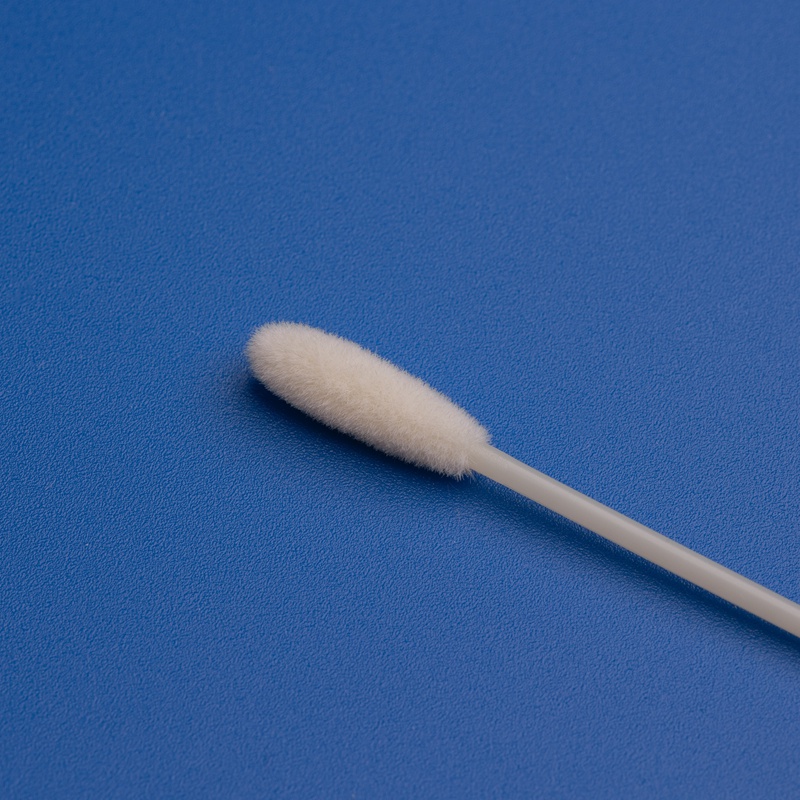
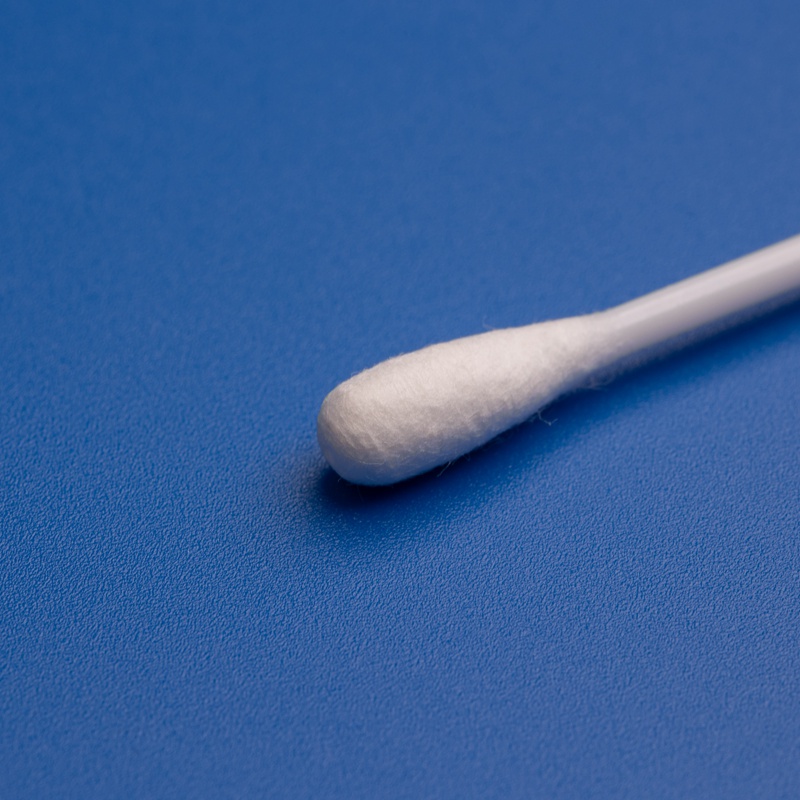
8. Acheter auprès de fournisseurs mondiaux vs. locaux : Ce que les acheteurs B2B doivent savoir
Lors de la procurement de consommables médicaux, les acheteurs B2B font face à une décision stratégique : devriez-vous acheter auprès de fabricants mondiaux ou de fournisseurs locaux ? Bien que les deux aient des avantages et des inconvénients, l'essor de l'IA dans la fabrication a significativement déplacé l'équilibre en faveur des acteurs internationaux avancés – particulièrement ceux offrant un contrôle qualité renforcé par l'IA et des certifications internationales.
Tableau de comparaison : Fournisseurs mondiaux vs. locaux de consommables médicaux
| Critères | Fournisseur mondial piloté par l'IA (p. ex., Hanheng) | Fournisseur local traditionnel |
|---|---|---|
| Contrôle de la qualité | Renforcé par l'IA, traçabilité numérique | Manuel, documentation limitée |
| Conformité réglementaire | Certifié CE, FDA, ISO | Peut manquer d'approbations internationales |
| Évolutivité | Capable de grands volumes, planification prédictive | Capacité limitée |
| Innovation produit | Piloté par la R&D, technologies brevetées | Investissement minimal en R&D |
| Tarification | Compétitif à grande échelle | Peut être plus élevé en raison des inefficacités |
| Délai d'exécution | Optimisé grâce à la prévision par IA | Variable, souvent retardé |
| Risque de défauts/rappels | Ultra-faible grâce au contrôle qualité par IA | Plus élevé en raison de l'inspection manuelle |
Quand choisir un fournisseur mondial comme Hanheng :
- Vous avez besoin d'une qualité de produit constante dans plusieurs régions
- Vous exigez des consommables conformes à la FDA/CE pour les marchés réglementés
- Vous prévoyez d'étendre vos offres de diagnostic ou de soins de santé
- Vous avez besoin d'une assurance qualité basée sur l'IA et d'une traçabilité numérique
- Vous souhaitez des prix compétitifs sans compromettre la conformité
Avantages stratégiques pour les distributeurs et les OEM
- Réputation de la marque
S'associer à un fournisseur high-tech élève l'image de votre marque et sa fiabilité dans le secteur de la santé. - Accès plus rapide au marché
Les produits approuvés CE et FDA simplifient l'enregistrement sur les marchés cibles. - Différenciation des produits
Les consommables inspectés par IA offrent des arguments de vente uniques pour les utilisateurs finaux. - Résilience de la chaîne d'approvisionnement
La prévision par IA aide à prévenir les ruptures de stock et les surstocks.
En revanche, les fournisseurs locaux peuvent offrir des avantages de proximité mais font souvent défaut en matière de qualité, d'innovation et de conformité mondiale. Par conséquent, de plus en plus d'acheteurs B2B se tournent vers des fournisseurs mondiaux axés sur l'IA, tels que Jiangsu Hanheng Medical Technology Co., Ltd., pour une viabilité à long terme et des rendements supérieurs.
9. FAQ : L'IA dans le contrôle qualité de la fabrication de dispositifs médicaux
Q1 : Quels types de consommables de test médical bénéficient le plus du contrôle qualité renforcé par l'IA ?
L'IA est la plus efficace pour les consommables à haut volume et sensibles à la précision, tels que :
- Prélèvements nasaux et pharyngés
- Brosses cervicales et collecteurs d'échantillons
- Kits d'examen gynécologique
- Emballages stériles et boîtes d'échantillonnage
Ces produits exigent une constance, une stérilité et une conformité réglementaire – tout cela est appliqué plus efficacement par les systèmes d'IA que par les méthodes manuelles.
Q2 : Le contrôle qualité basé sur l'IA est-il plus coûteux ?
Bien que les coûts initiaux de mise en œuvre soient plus élevés, le contrôle qualité par IA entraîne des économies significatives à long terme grâce à :
- Réduction des coûts de main-d'œuvre et d'inspection
- Moins de rappels de produits
- Meilleure utilisation des matériaux
- Délai de commercialisation plus rapide
Pour les acheteurs B2B, cela se traduit par des prix plus compétitifs et moins de perturbations dans la chaîne d'approvisionnement.
Q3 : Comment vérifier si un fabricant utilise l'IA dans son processus de contrôle qualité ?
Demandez aux fournisseurs de fournir :
- Documentation des systèmes de vision par machine ou d'analyse prédictive
- Rapports d'échantillons de détection de défauts
- Registres de traçabilité des produits
- Études de cas ou témoignages de clients
Jiangsu Hanheng, par exemple, offre une transparence totale sur ses systèmes de contrôle qualité par IA et accueille favorablement les audits et les revues techniques.
Q4 : Quelles certifications rechercher lors de l'approvisionnement en consommables médicaux inspectés par IA ?
Assurez-vous que votre fournisseur détient :
- ISO 9001 : Gestion de la qualité
- ISO 13485 : Fabrication de dispositifs médicaux
- Marquage CE (Europe)
- Enregistrement auprès de la FDA (États-Unis)
- Brevets de modèle d'utilité ou technologies propriétaires en contrôle qualité par IA
Les certifications et le portefeuille de brevets de Hanheng reflètent leur engagement envers les normes mondiales et l'innovation.
Q5 : Dans quel délai puis-je espérer une livraison si je commande auprès d'un fournisseur axé sur l'IA comme Hanheng ?
Grâce à la planification prédictive et au contrôle qualité en temps réel, Hanheng propose :
- Délais standards de 7 à 14 jours pour les SKU réguliers
- Traitement accéléré pour les commandes urgentes
- Exécution constante pendant les pics de demande
Pour les besoins d'approvisionnement B2B urgents, l'IA renforce l'agilité sans compromettre la qualité.
Conclusion et appel à l'action
Le contrôle qualité alimenté par l'IA transforme le paysage de la fabrication de dispositifs médicaux – en offrant une constance, une conformité et une efficacité des coûts inégalées. Pour les acheteurs B2B, s'approvisionner auprès de fabricants qui exploitent l'IA n'est pas seulement une option – c'est une impérieuse nécessité stratégique.
Jiangsu Hanheng Medical Technology Co, Ltd. se trouve à l'avant-garde de cette transformation, combinant des systèmes d'IA de pointe avec une base de fabrication solide, des certifications mondiales et un portefeuille complet de consommables de test médical de haute qualité.
✅ Que vous soyez un laboratoire de diagnostic, un OEM ou un distributeur, Hanheng propose :
- Écouvillons, brosses et kits de diagnostic inspectés par IA
- Normes de production certifiées ISO, FDA, CE
- Délais de livraison prévisibles avec une production évolutive
- Transparence inégalée et traçabilité numérique
📩 Prêt à moderniser votre chaîne d'approvisionnement avec une assurance qualité renforcée par l'IA ?
Contactez l'équipe d'experts de Hanheng à [email protected] ou visiter www.hanheng-medical.com pour demander un catalogue de produits, une proposition de prix ou une consultation gratuite.
Votre qualité. Notre précision. Alimenté par l'IA.
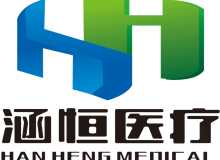
Jiangsu Hanheng Medical Technology Co, Ltd.
Nous sommes l'un des principaux fabricants de consommables médicaux de haute qualité et nous nous engageons à assurer la précision, la sécurité et le respect des normes internationales. Grâce à une technologie de production avancée, à un contrôle de qualité strict et à une équipe de recherche et développement dévouée, nous fournissons des solutions fiables adaptées aux besoins changeants de l'industrie des soins de santé.

